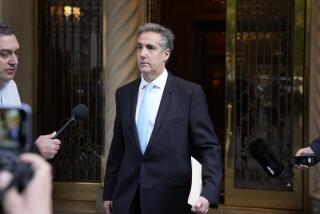Roy Cohn, Hero and Villain of McCarthy Era, Dies at 59
WASHINGTON — Roy Marcus Cohn, revered and reviled ever since he served as Sen. Joseph R. McCarthy’s chief inquisitor in the bitter hunt for communists in the l950s, died Saturday of complications stemming from AIDS. He was 59.
Cohn, a high-priced New York lawyer until his recent disbarment, died at 6 a.m. at the clinical center of the National Institutes of Health in Bethesda, Md., a Washington suburb, where he was undergoing treatment, according to Irene Haske, chief of the center’s communications.
“The immediate cause of death was cardiopulmonary arrest,” said Haske, who added that there were two secondary causes: “dementia” and “underlying HTLV-III infections.” Researchers say the HTLV-III virus causes AIDS, the fatal disease that attacks the body’s immune system, leaving it vulnerable to otherwise nonfatal illnesses.
Citing patient confidentiality, Haske said she could only provide information on the official death certificate and refused to discuss Cohn’s treatment beyond saying he was in a research program at the NIH clinical center. Although Cohn had been treated by medical specialists in acquired immune deficiency syndrome since 1984, he persistently denied widespread rumors that he had the disease and insisted he was suffering from liver cancer.
Cohn, the volatile chief counsel to McCarthy’s communist-hunting Senate subcommittee in 1953-54, held center stage as both hero and villain during one of the stormiest periods in modern American political history. Afterward, he courted controversy and headlines through most of his career.
Manhattan Society Satrap
Thrice indicted, thrice acquitted, Cohn survived and thrived as one of the nation’s best-known lawyers. He represented the rich and famous in prominent divorce and Mafia trials, helped screen federal judges in New York for the Reagan White House and held court as a Manhattan society satrap.
Despite his long illness, Cohn remained in the public eye until the end. A New York appeals court ended his legal career when it ordered him disbarred on June 23 for professional misconduct. Two months earlier, federal prosecutors sued Cohn to collect nearly $7 million in back taxes.
Then, as always, the combative Cohn had denied all charges, denounced his accusers--and basked in the limelight.
“When it comes to making headlines,” Cohn once boasted, “I’m sui generis. “
Son of a New York Judge
Born in the Bronx on Feb. 20, 1927, Cohn grew up an only child. His father, Albert, was a prominent New York State Supreme Court judge, and his mother held court as a society matron. Their home in a wealthy section of the Bronx drew powerful judges, politicians and businessmen.
A precocious youth, Cohn spent school vacations attending trials and working in Democratic political campaigns. He rushed through New York’s Columbia University, finishing both college and law school in less than four years. He was graduated at age 20 and had to wait a year until he was 21 before he could take the bar exam in 1948.
Cohn’s fame grew quickly. As an assistant federal prosecutor in New York, he helped prosecute American Communist Party leaders for conspiracy. In 1951, Cohn helped prosecute Julius and Ethel Rosenberg, who were executed for passing atomic secrets to the Soviets. Although he played a minor role, Cohn frequently cited the case.
No Doubts About Rosenbergs
“Their guilt was so overwhelmingly proven that I haven’t had one second’s doubt about it in the years since the conviction,” Cohn said in 1981 about the controversial case. He said his contacts with FBI agents convinced him that “it was true--that there was an Alger Hiss and a worldwide communist movement that was as bad as Nazism and Hitler.”
In early 1953, the 26-year-old Cohn was hired as chief counsel to McCarthy’s Senate Permanent Subcommittee on Investigations, then at its height. For the next two years, Cohn later claimed, he was the “savvy” behind McCarthy’s wide-ranging and often unfounded attacks on alleged subversives in the U.S. government and military.
Shortly after joining the staff, Cohn and G. David Schine, a rich young friend and unpaid consultant to McCarthy’s committee, went on a 17-day tour of Europe. They claimed they were investigating U.S. information services abroad, but were widely ridiculed as “junketeering gumshoes” on a “Keystone Kops binge.” Even so, they returned home as celebrities.
McCarthy’s Downfall
Ultimately, Cohn’s relationship with Schine helped bring McCarthy down. After Schine was drafted in late 1953, Cohn’s heavy-handed demands that the Army grant Pvt. Schine special privileges led to a clash with the Eisenhower Administration and 36 days of tumultuous televised hearings.
Millions of Americans watched the real-life TV drama as McCarthy and Cohn tangled with top Army officials, trading bitter charges and accusations. Army counsel John G. Adams testified that Cohn had threatened to “wreck the Army.” Army special counsel Joseph N. Welch also accused Cohn of doctoring a photo that was introduced as evidence.
Cohn and McCarthy in turn charged the Army with “coddling communists” and hiding “sexual deviates.” Badgering witnesses and railing against “Fifth Amendment communists,” Cohn accused Army officials of holding Schine hostage as “blackmail” to stop McCarthy’s probes of alleged subversives at the Army’s Signal Center at Ft. Monmouth, N.J.
Photo Tells Story
Cohn was forced to resign by a 4-3 vote of the subcommittee in July 1954, after the tempestuous hearings ended in stalemate. He later proudly hung on his office wall an enduring photo of the era: the slick-haired, heavy-lidded legal boy wonder Cohn whispering advice into scowling mentor McCarthy’s ear.
“He was the most brilliant young fellow I’ve ever met,” McCarthy said later. Cohn returned the compliment, steadfastly defending the junior senator from Wisconsin, who was censured by the Senate in 1955 and died an alcoholic in 1957.
Defending McCarthy’s ruthless tactics, Cohn told Penthouse magazine in 1981: “I don’t see anything wrong with blacklists.” To another interviewer, he added: “I don’t buy this business about people jumping out windows and ruined lives. It’s a lot of baloney.”
sh Might Do It Differently
Cohn nonetheless tempered his assessment of his role in those divisive days. “Would I do everything all over again? No. What the heck. Time and experience change all of us,” he said.
Back in New York, Cohn remained a magnet for publicity. Between 1964 and 1970, federal prosecutors indicted and tried Cohn three times on charges of fraud, blackmail and perjury for his business dealings as a financier and boxing promoter. Each time, Cohn called the case a “vendetta.” Each time, he was acquitted.
“This young man is unique in his time and few generations have known his equal,” Life magazine wrote in 1963, as the first trial was opening. “He already has accumulated more fame, more notoriety, more material success and more enemies than most men manage to do in all a lifetime.”
‘Legal Executioner’
In the 1970s, Cohn developed a lucrative legal practice specializing in lurid divorce cases and Mafia trials. Hailed as a “legal executioner” by Esquire magazine, he amassed a list of clients that included reputed mob bosses Vito Genovese and Carmine Galante, the late billionaire Aristotle Onassis, starlet Bianca Jagger, the Studio 54 disco, the New York Diocese of the Roman Catholic Church, the New York Yankees and real estate mogul Donald Trump.
Cohn was less successful with the Internal Revenue Service. The IRS began auditing Cohn’s tax returns in 1959 and began filing liens shortly afterward. Last April 3, it sued him for nearly $7 million in back taxes, interest and penalties. The case highlighted Cohn’s remarkable life style.
Although he reported little income--$20,424 on his 1983 tax return, for example--Cohn, a lifelong bachelor, enjoyed an unlimited expense account. His friends and his law firm legally owned his handsome Manhattan town house, his estate in Greenwich, Conn., vacation homes in Cape Cod and Acapulco, plus the yachts, limousines and private jets Cohn enjoyed.
No ‘Schlump Dresser’
“I can’t dress like a schlump,” the well-tanned and impeccably dressed Cohn said in 1981. “I have to go to three or four dinners a week, and I need several tuxedos. A dinner party for a client with champagne, caviar, and so forth will cost a couple of thousand dollars. My weekly restaurant bill is probably $1,000. My phone bill every month comes to $3,000 or $4,000.”
Known for Legal Audacity
Cohn’s legal audacity was legend. Once asked how he would have defended President Richard M. Nixon in the Watergate case, he replied: “Oh, it would have been a cinch. Get rid of the tapes. I mean, that takes exactly five minutes.”
Similarly, Cohn wrote in a signed opinion piece for the New York Times that Vice President Spiro T. Agnew made a “dumb mistake” by resigning his office and pleading no contest to charges of tax evasion. “Some people were obviously out to get you,” Cohn wrote.
Cohn’s friends were of the high and mighty. He traded Christmas presents for 20 years with former FBI Director J. Edgar Hoover. He squired New York Cardinal Francis J. Spellman on his yacht and lunched with Cardinal Clarence T. Cooke. His highly publicized New Year’s and birthday parties drew author Norman Mailer, broadcaster Barbara Walters, publisher Rupert Murdoch, CIA Director William J. Casey, European bluebloods and others.
But throughout his career, Cohn enjoyed attacking the Establishment, particularly other lawyers. In his 1981 book, “How to Stand Up for Your Rights and Win!,” Cohn described lawyers as “the largest, most organized set of scoundrels in this society.”
Last year, Cohn blamed those attacks and his ties to McCarthy for the disbarment proceedings against him. But after a three-year investigation, the Appellate Division of the New York State Supreme Court unanimously agreed that Cohn had practiced “dishonesty, fraud, deceit and misrepresentation” in four cases and barred him from practicing law.
Times staff writer Lee May contributed to this story.
More to Read
Sign up for Essential California
The most important California stories and recommendations in your inbox every morning.
You may occasionally receive promotional content from the Los Angeles Times.











